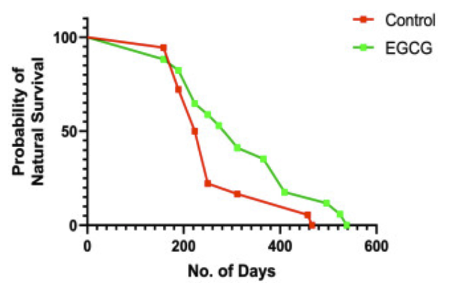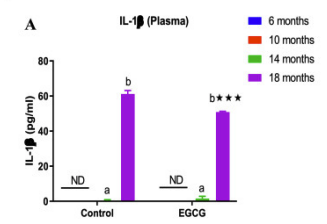This study evaluated the effects of chronic consumption of green tea component epigallocatechin gallate (EGCG) on lifespan and markers of aging in mice.
Key Points:
Long term EGCG consumption of EGCG showed several benefits in aging mice:
- Lowered the average risk of death in aging mice 46.96%.
- Decreased signs of DNA damage and inflammation due to aging.
- Improved cell waste clearance
Study in Aging Mice Evaluated Effects of EGCG on Lifespan, Immune Health, and Microbiome:
Male mice were divided into groups:
- Control: commercial feed and water
- EGCG: commercial feed and water supplemented with 100 mg/kg/animal body weight based on their previous observations.
EGCG administration began at 2 months of age and continued until 18 months of age. Testing was performed at 6 months and every 4 months thereafter.
Consumption of EGCG Improved Lifespan
The research investigated the probability of survival of the mice in each group.

In the figure, a comparison of the mouse lifespans throughout the experiment showed a faster decline in the control group (red line) than the EGCG dose mice (green line), indicating that the treated mice experienced increased longevity.
“An average 46.96% lower risk of death in the EGCG fed animals as compared to the control group.”
EGCG Improved Cell Health
Cellular senescence (CS) stops cell division, triggered by DNA damage, stress, or shortened chromosomes. While CS prevents damaged cells from growing, too much can contribute to aging diseases.
EGCG reduced the prevalence of markers indicative of CS and age-related inflammation.
Adipose and small intestinal tissues were particularly sensitive to EGCG treatment.
“Remarkably, this apparent effect appeared to be slightly yet significantly attenuated in EGCG fed animals in the same age group suggesting systemic attenuation of inflammatory damage.”
EGCG Reduced Inflamm-aging
In aging mice, there was a large increase of the inflammatory markers IL-1β and TNF-α, while a decrease was noted in EGCG treated mice.

This figure shows the levels of the inflammatory molecule, IL-1β, were significantly increased in aged mice (18 months, purple bars). However, the levels of IL-1β were significantly lower in mice treated with EGCG (on the right) compared to control mice (on the left).
“This apparent effect appeared to be slightly yet significantly attenuated in EGCG fed animals in the same age group suggesting systemic attenuation of inflammatory damage.”
EGCG Enhanced Clearance of Cell Waste
Autophagy, a process your body uses to recycle old and damaged cells, slows down with age.
As the mice aged, the researchers observed a build up of a protein (p62) involved in removing toxic waste from cells, indicating impaired autophagy.
“Thus, the accumulation of p62 in cells is considered a marker of reduced autophagic flux.”
Mice that received EGCG did not show impaired autophagy.
“On the contrary, levels of p62 did not increase in EGCG treated animals suggesting preserved autophagic response.”
Conclusion
This study found that the continued administration of Green Tea Catechin (EGCG) improved the lifespan, cellular health, and cell waste clearance in aging mice.
“Chronic EGCG/green tea consumption may be considered a beneficial nutritional strategy in the pursuit of developing anti-cellular senescence-based longevity and healthy aging therapies.”
